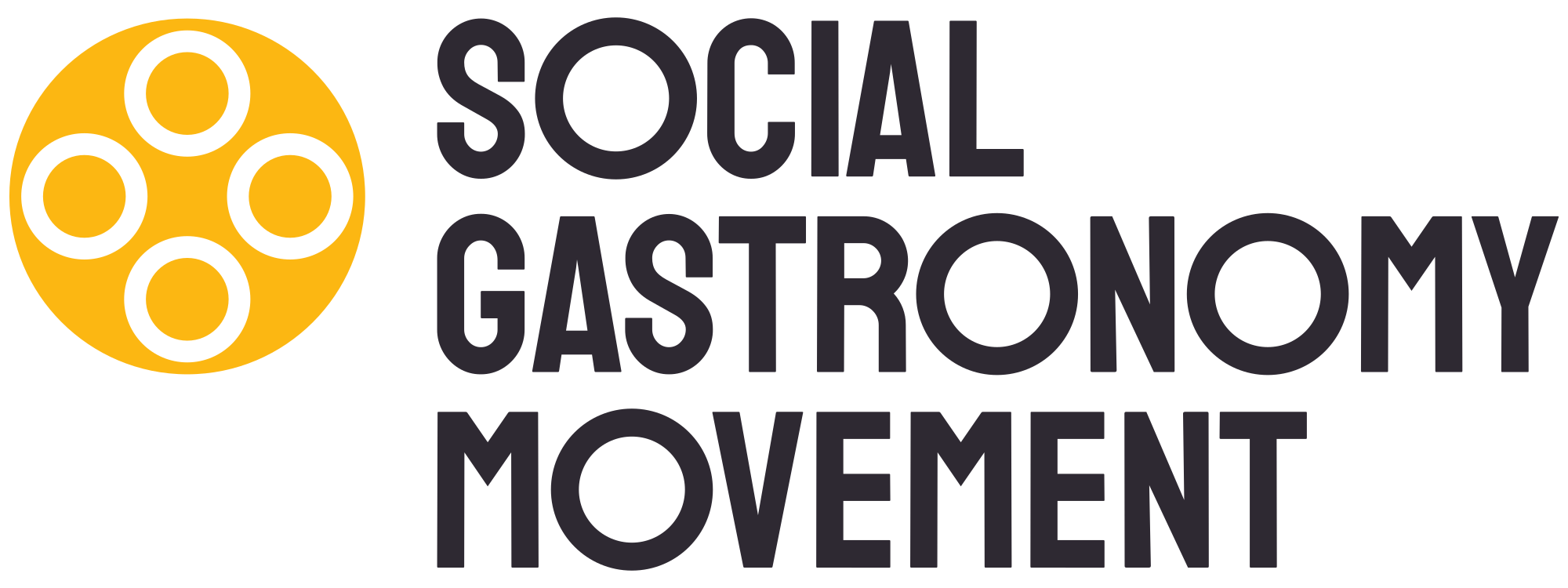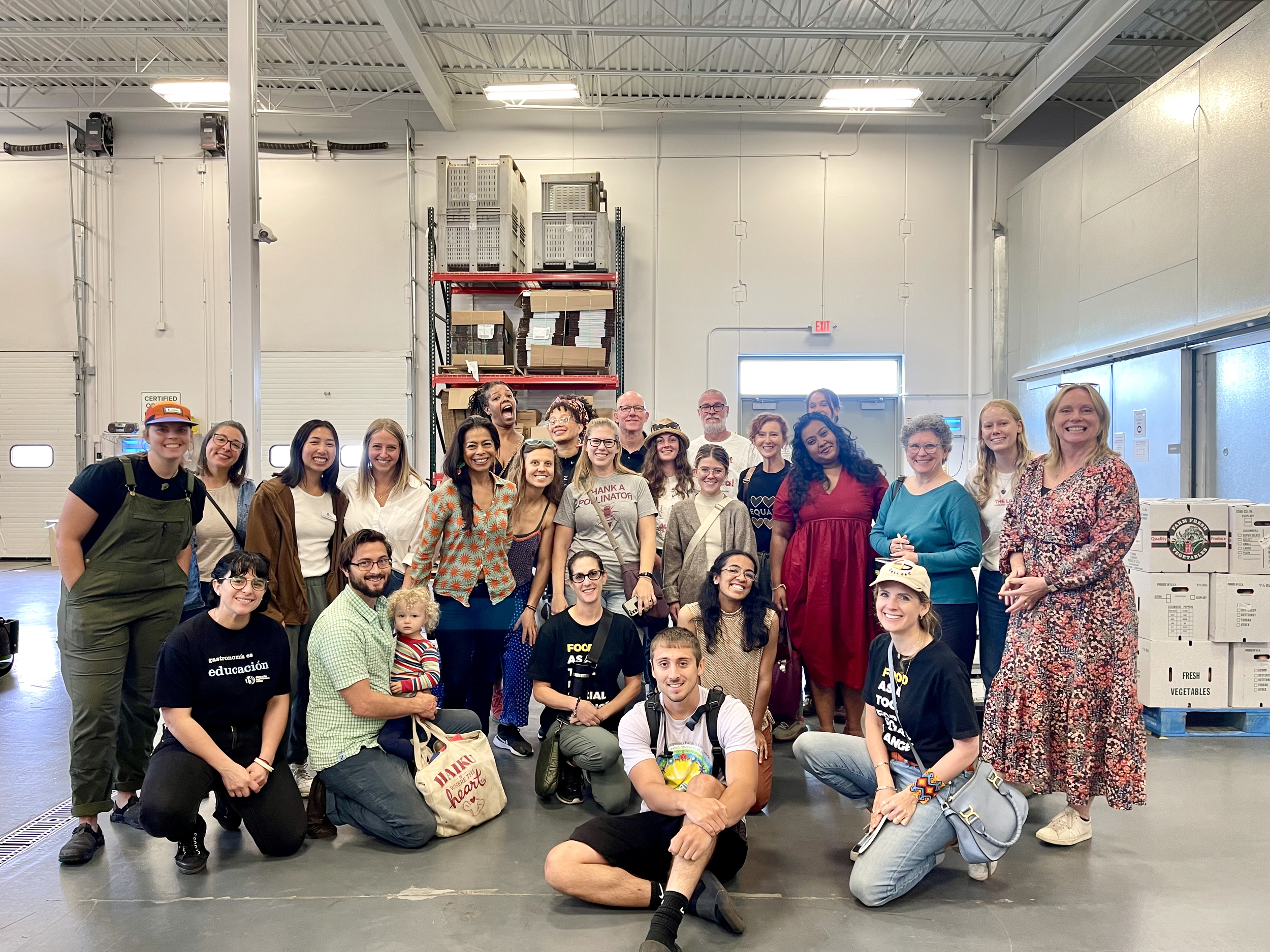Fall Plenum and Learning Journey
Written by Rosie Russell
During the second weekend of September 2023, over 60 people from across the globe gathered in the Twin Cities Metropolitan Area (TCMA) around a common interest: food justice. The event, a fall plenum and learning journey, was co-hosted by the Social Gastronomy Movement, Metro Food Justice Network (MFJN), and Appetite For Change.
It was designed to share skills, knowledge, and lessons about addressing food scarcity and access across the food value chain, from local roots to global change. The event brought together farmers, food makers, educators, community gardeners, policy advocates, food waste practitioners, and many others, who together enriched the space with stories and a sense of hope. As Melvin Giles, a respected elder in the TCMA, put it, “The arc of justice is moving.”
A just and sustainable local food system requires us to connect globally and act locally. You may be wondering what this means and how we do it; this event attempted to answer these questions.
At MFJN, a collaborative effort is underway to repair the food value chain in the TCMA from a grassroots level, restoring health and well-being to all, especially those whose cultures and ways of life have been slandered and stripped of resources. They work as a team, sharing knowledge, responsibility, accountability, gratitude, and recognition as they fight for food justice in its many colors.
Power is being returned to those doing the work, and healthy food is being shared across cultures, disciplines, and geographies. MFJN works to address issues faced by many others across the globe. By connecting a global network to learn and exchange best practices for acting local, a ripple of impact can occur.
MFJN has twelve action teams working to create systemic change from different angles of our local food system. During the fall plenum portion of this event, four of MFJN’s action teams shared the progress they have been making, the challenges they are facing, and the tools and strategies they are using to effect change. After each action team reported their progress, attendees of the event reflected on synergistic approaches being used in their respective communities.
The Food Medicine team is working with community members throughout Minnesota to find a shared definition that will help with unified messaging and community buy-in.
The Policy team collaborated with others to successfully acquire funding for four policy priorities in Minnesota’s 2023 legislative session. They will continue to push for policy change that sustains and spreads impact equitably.
The Cross Campus, Food Access Coalition team received funding from a Minnesota Department of Health grant, which they will use to hire an employee to help them emerge as a team as they continue their hard work.
The Prepared Meals team is recovering food from local restaurants and getting it into hunger relief channels and schools. They are pushing for food options that more accurately reflect the cultures of food recipients.
Following the plenum, attendees had lunch and reflected on their learning. This was the perfect segue into the learning journey, which brought attendees on tour across the TCMA to visit six food justice organizations. Each organization shared its ingredients to a just food system. The key takeaways of this learning journey are below.
The PROBLEM: People struggle to feed themselves and their families in a region with an abundance of food.
Their VISION: Everyone can afford, access, and enjoy locally grown food that reflects their cultures and values.
Who has the POWER? Local organizations, vendors, and leaders who represent the community’s diverse preferences.
Who is the PRIORITY? Those historically excluded from the larger food system, and in search of one that includes them.
Who is their AUDIENCE? Future leaders, local partners, and community members who share the vision and can deliver it.
Messages of excitement, perseverance, frustration, exhaustion, inspiration, and hope were all intertwined throughout this two-day event.
Using the stories and lessons that were shared, many new connections and commitments are being made across sectors, organizations, and individuals, from global to local. We hope you will join us in building a just food system by attending an event, volunteering at a local organization, calling your legislators, or joining us at MFJN or SGM! Your contributions and commitments create the ripple of impact needed to affect real change in our food system.
Rosie Russell is a social sustainability professional residing in the Twin Cities metro area. She holds a Bachelor of Science in Sustainable Development from Buena Vista University, and a Master of Science from the University of Minnesota, where her research focused on co-designing a social organizational life cycle assessment framework in partnership with The Good Acre, a food hub in Falcon Heights, MN. In addition to having over six years of experience in watershed management planning, she has co-founded and co-led numerous diversity, equity, and inclusion committees and routinely presents about her work and research at conferences, universities, and schools. Her expertise is centered around empowering connections through social network mapping, co-designing stakeholder engagement methodologies, and building shared language across multi-disciplinary networks. Rosie is currently working as a freelance consultant.




